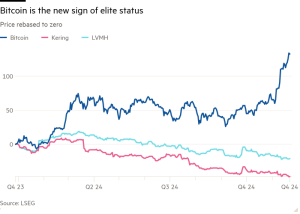Milei’s pivot from radical outsider to pragmatist

“Would you trade with an assassin?” asked Javier Milei in his presidential campaign last August, when he was accusing China of killing dissidents.
And the answer, it appears, is “yes”.
Since winning office, Argentina’s president has changed his tune about the South American nation’s second-largest trading partner. He now plans to visit China in January for a regional summit. Beijing, he told the Financial Times, is “truly a super-friendly partner. They have really surprised me.”
Notorious last year for hurling often vulgar insults at world leaders — the Pope was an “imbecile” while Brazil’s leftwing president Luiz Inácio “Lula” da Silva was a “corrupt communist” — Milei’s newfound pragmatic streak extends well beyond China.
When Venezuela’s authoritarian government expelled Argentina’s diplomats in July, Milei spoke confidentially to Lula, and Brazil subsequently agreed to extend diplomatic cover to protect Argentina’s embassy in Caracas, according to a person familiar with the discussions.
Milei now plans to meet Lula in person for the first time, in Rio de Janeiro, during November’s G20 summit. On the agenda will be how to advance a long-stalled trade agreement between the EU and Mercosur, the South American trading bloc Milei had vowed to quit, but then embraced.
Milei is similarly pragmatic these days about the US. Despite his open admiration for former president Donald Trump — part of a global network of hard-right allies that includes Vox party leader Santiago Abascal in Spain and former president Jair Bolsonaro in Brazil — the Argentine leader claims he has “an excellent relationship with the Democratic Party”.
He insists that relations with Washington will not be affected by the outcome of next month’s presidential election, saying he will be a US ally independently of whether Democrats or Republicans are governing.
Even more surprisingly, Milei told the FT that Argentina’s voters “didn’t put me here to sort out ideological battles; they put me here to sort out people’s problems”.
This from a self-declared warrior against “cultural Marxism” who had vowed to shrink the state to a bare minimum and allow the free market to take over, even to the point of musing publicly about allowing the sale of human organs (he later retracted).
As he approaches a year in power, Milei “still keeps the ideological stuff in speeches but in practice he’s become more pragmatic, with a strong dose of realism”, says Sergio Berensztein, a political consultant. “The learning curve is quite surprising.”
Milei remains an unconventional leader, prone to sudden outbursts on social media, to keeping the curtains permanently drawn in his presidential office and quoting obscure libertarian economic textbooks. But diplomats in Buenos Aires confess to surprise at how the former Rolling Stones tribute band member and “anarcho-capitalist” has become a little more presidential in office.
His inner circle is dominated by his sister Karina (now presidential chief of staff) and social media guru Santiago Caputo. But Milei “has some serious, credible, quite mainstream people in his team”, said one senior diplomat in Buenos Aires. “He has picked his ministers quite well.”

Milei campaigned with a radical outsider image, sporting a black leather jacket, long sideburns, unkempt hair, and a chainsaw. He denounced Argentina’s traditional politicians as a venal “caste”. But, in office, he has worn a suit and negotiated with moderate politicians from the opposition Peronist movement, as well as the conservative PRO party that answers to former president Mauricio Macri.
Their support has allowed him to pass wide-ranging legislation deregulating the heavily controlled Argentine economy and won him emergency powers to decide on a range of economic measures for a year without congress.
However, Milei knows he needs a stronger legislative base if he is to leave a lasting legacy. His La Libertad Avanza party has no state governors and only a small minority of seats in both chambers of congress.
This may lead the radical outsider into the ultimate compromise with the “caste”: an alliance with Macri’s party for next year’s midterm elections. “Maybe we’ll go together,” Milei said with a grin when the FT asked about a possible electoral pact. “Suddenly, we will get 60 per cent of the votes.”
Such talk has led to accusations that Milei is selling out. Axel Kicillof, the Peronist governor of Buenos Aires province, claims the president has committed “an enormous electoral fraud” by abandoning his radical campaign pledges.
“He said he would govern in a different way and you can’t do things differently with the same old people,” Kicillof argues. “But, today, we look at the government and the three most important ministers . . . are three officials [from the party who] came third in the election.” Economy minister Luis “Toto” Caputo, security minister Patricia Bullrich and deregulation minister Federico Sturzenegger all served in Macri’s 2015-19 government.
Milei has managed to keep a distance from Macri’s party in public while cutting deals in private. But, as this most unorthodox of politicians turns more mainstream, can he keep the popularity he won as a radical outsider?
#Mileis #pivot #radical #outsider #pragmatist




